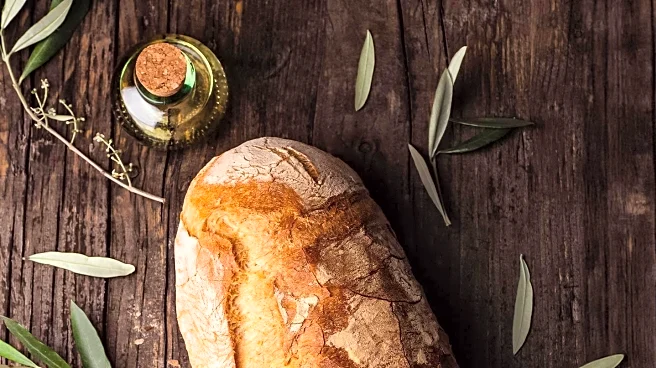What's Happening?
Olive loaf, a once-popular deli meat from the 1940s to the 1970s, has largely disappeared from American grocery shelves. Known for its distinctive appearance with green olives and red pimentos embedded in the meat, olive loaf was a staple in post-World War II American lunchboxes. It was marketed as an affordable and convenient option for middle- and working-class families. However, growing health concerns about processed meats, high sodium content, and preservatives have led to its decline. Despite its nostalgic appeal, olive loaf has not maintained the cultural significance of other processed foods like Spam or Kool-Aid.
Why It's Important?
The decline of olive loaf reflects broader shifts in consumer preferences towards healthier and more natural food options. As awareness of the health risks associated with processed meats has increased, consumers have gravitated towards fresh and minimally processed foods. This trend has significant implications for the food industry, which must adapt to changing consumer demands by offering healthier alternatives. The nostalgia associated with olive loaf highlights the cultural impact of food and how it can evoke memories, yet it also underscores the challenges of reviving products that no longer align with contemporary health standards.
What's Next?
While a revival of olive loaf seems unlikely, any potential comeback would require significant rebranding to address health concerns. This could involve creating a version with lower sodium and fewer preservatives, possibly using turkey or plant-based ingredients. However, the visual and textural oddness of olive loaf may continue to deter consumers. The food industry may explore nostalgia marketing strategies to capitalize on the emotional connection some consumers have with olive loaf, but its future remains uncertain.
Beyond the Headlines
The story of olive loaf illustrates the complex interplay between nostalgia and modern health consciousness. It raises questions about how food products can balance cultural heritage with evolving health standards. The decline of olive loaf also reflects broader societal changes, such as the increasing importance of health and wellness in consumer decision-making. This case highlights the potential for nostalgia to influence marketing strategies, even as health considerations take precedence.










